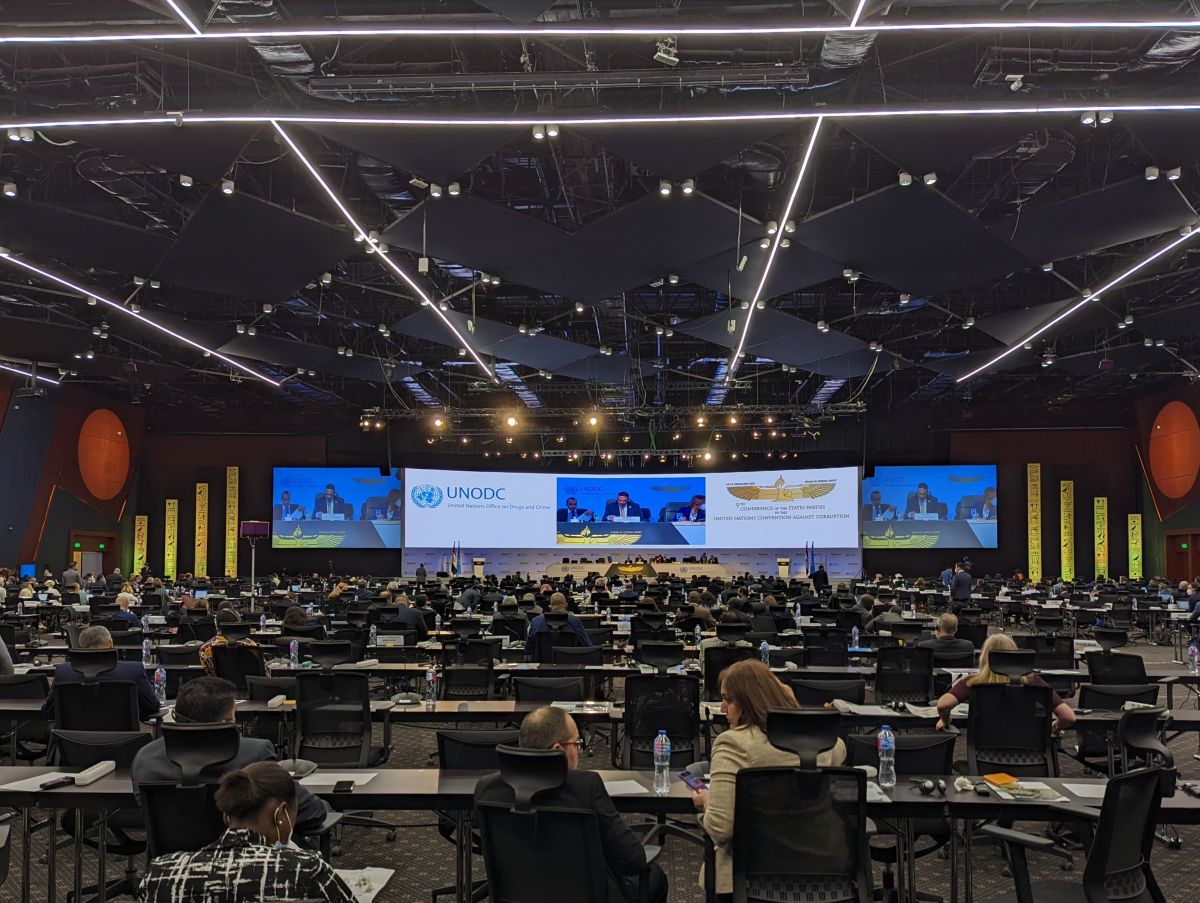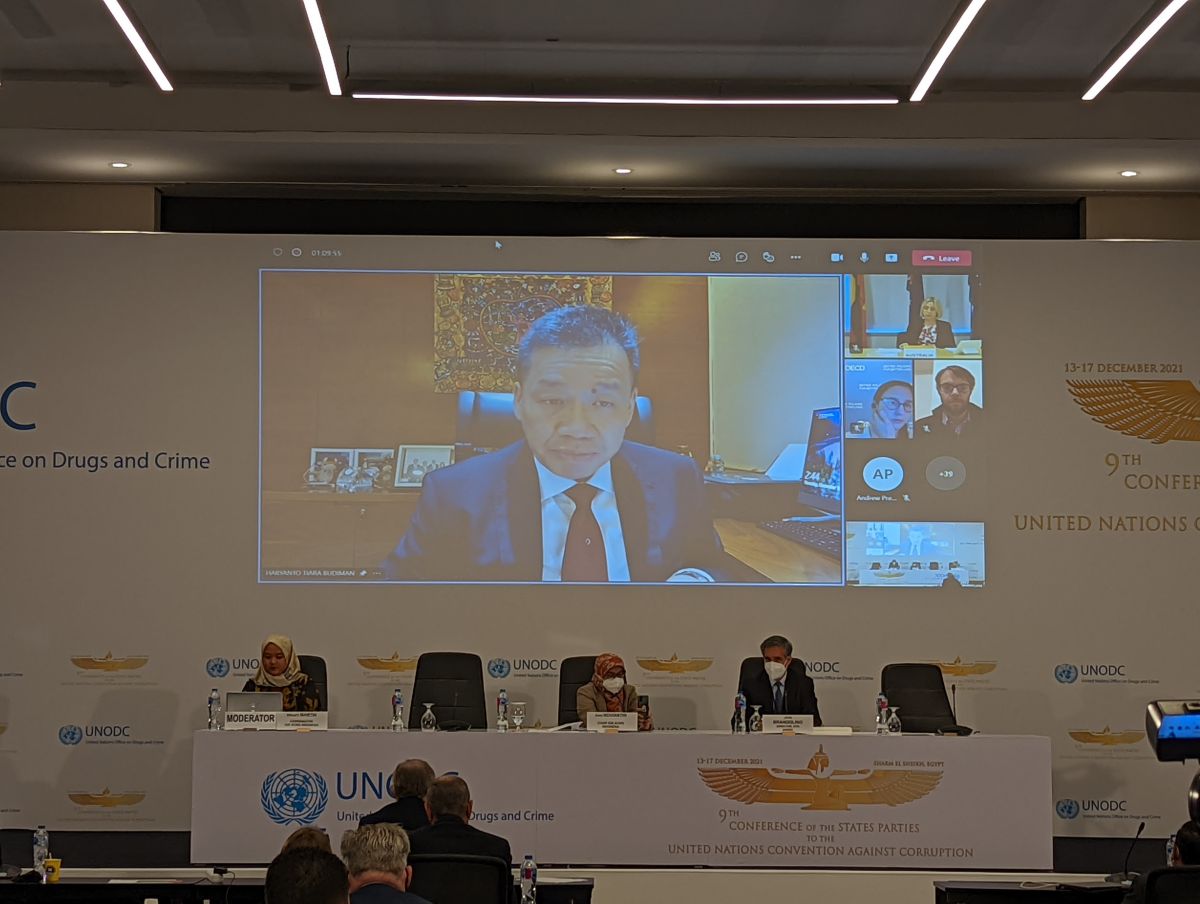Last week, IFAC participated as an official observer at the UNCAC CoSP9, or more formally the Ninth session of the Conference of the States Parties (CoSP) to the United Nations Convention against Corruption (UNCAC).
IFAC at UNCAC CoSP
The UNCAC is a legally binding treaty with 189 “States Parties” worldwide. It requires countries to criminalize corruption and related acts and addresses preventive measures, law enforcement, international cooperation, asset recovery, technical assistance and information exchange. The date of its signing in 2003—December 9th—is now celebrated as International Anti-Corruption Day.
The CoSP is the main policymaking body of the UNCAC. It meets every two years to discuss and adopt resolutions and decisions in furtherance of its mandate: improving implementation capacity, enhancing cooperation between states, and reviewing the implementation of the UNCAC.

Delegates discuss the implementation of the UNCAC.
As the name suggests, the primary participants at the UNCAC CoSP are the States Parties to the convention. A limited number of observers and other participants representing key stakeholders may participate, primarily from NGOs and civil society organizations, many of which are IFAC’s key global engagement partners.
The discussions at the proceedings covered a range of issues including updates from the States Parties on their recent actions taken to implement the convention, how to enhance provisions related to asset recover and international cooperation and building on the UNGASS Declaration. The CoSP cloncluded with the adoption of the Sharm El-Sheikh Declaration, which underscores the increased risks of corruption presented by urgent economic and health relief spending and calls on the States Parties to develop guidelines to strengthen cooperation to prevent, identify, investigate and prosecute corruption during times of emergencies and crisis response and recovery.

Sara Carnegie, IBA, and Scott Hanson, IFAC, moderate a hybrid event.
As part of the proceedings, IFAC had the opportunity to deliver, in person, a statement highlighting the accountancy profession’s important role in fighting corruption (text in full below). The agenda also included an official side event hosted by IFAC and the International Bar Association (IBA) on the role of our professions in fighting corruption. This follows another joint IFAC-IBA event that took place at a separate UN summit this summer (i.e., the UNGASS or United Nations General Assembly Special Session against Corruption).
IFAC’s participation in UNCAC CoSP9 is part of our broader commitment to global integrity issues.
OECD Anti-Bribery Recommendation
IFAC has been engaged with the Organisation for Economic Co-operation and Development (OECD) and its Anti-Bribery Working Group as part of a multi-year review of the OECD’s Anti-Bribery Recommendation (ABR). The ABR, originally published in 2009, serves as implementation guidance for the OECD Anti-Bribery Convention. Entering into force in 1999, the Anti-Bribery Convention establishes legally binding standards to criminalize bribery and has been implemented by all 38 OECD members plus 6 major non-OECD countries. The OECD Anti-Bribery Convention serves as an additional layer on top of the UNCAC’s global baseline.
IFAC’s engagement in the ABR review focused on the importance of professional bodies and enforcement of ethical codes in fighting corruption and was facilitated by our strong relationship with Business at OECD, the officially recognized business voice to the OECD. Our key points are summarized in a comment letter submitted in the final rounds of the review (August 2021). The result was direct impact on the final instrument as adopted earlier in December 2021. Specifically, IFAC’s advocacy delivered the following text in the revised ABR:
Professional associations that exercise regulatory powers over certain professions may also play a significant role in adopting and implementing robust ethics standards for their members, including by setting out frameworks on actions to be taken by their members to prevent bribery or when confronted with suspected acts of foreign bribery and related offences committed by clients or employers.
This recognition of the importance of professional bodies and ethical standards is a significant contribution to the global debate surrounding the role of the accountancy profession with respect to global integrity issues—not just bribery, but also corruption more broadly, money laundering, and other financial crimes.
Broader Global Engagement
IFAC’s recent global engagement goes beyond the UN and OECD to cover the full spectrum of integrity topics. IFAC has been closely engaged with the Financial Action Task Force (the FATF, the global anti-money laundering standard setter), on key issues such as beneficial ownership transparency (see comment letters dated August 2021 and November 2021, as well as the 2020 IFAC-CPA Canada Report) and the responsibilities of international accountancy networks for centralized AML compliance processes.
This engagement is complemented by IFAC’s educational series on anti-money laundering, produced in partnership with ICAEW, which helps bring to life the FATF’s Guidance for a Risk-Based Approach for the Accounting Profession. In 2022, IFAC and ICAEW look to further build on the AML education series with additional installments to further assistance professional accountants as AML risks continue to evolve.
In 2021, IFAC accelerated its engagement with the World Economic Forum (WEF) Partnership Against Corruption Initiative (PACI). The WEF PACI is a CEO-led platform with approximately 90 signatories from different sectors across the globe, serving as a leading business voice on anti-corruption and transparency. One of the key achievements of the WEF PACI was the publication of its Unifying Framework for Gatekeepers. The Unifying Framework—which IFAC has endorsed—looks to bring all “gatekeeper” professions up to a common level of integrity, transparency and accountability. For IFAC, this means bringing all gatekeepers up to the ethical bar established by the IESBA Code.
All of this global engagement builds off of IFAC’s Point of Views on Fighting Corruption and Money Laundering and Greater Transparency and Accountability in the Public Sector, now available in Arabic, French, Spanish and Russian. Our work on global integrity issues parallels IFAC’s continued support for Public Financial Management as reflected by the International Public Sector Financial Accountability Index, as well as our support for the International Public Sector Accounting Standards Board (IPSASB), as seen in our recent Train the Trainer: Introduction to IPSAS package of training materials.
Looking Ahead to 2022
As a final example of our engagement in critical global integrity issues, IFAC continued its long-standing leadership role in the Business 20 (B20, the official business engagement forum for the G20) as a Network Partner of the Integrity & Compliance Taskforce under the 2021 Italian Presidency. The Integrity & Compliance Task Force addresses important issues like public sector integrity, corporate reporting related to societal and governance issues, beneficial ownership transparency, and whistleblower protection. IFAC looks to build on this engagement in 2022 under the Indonesian Presidency. IFAC also speaks directly to the G20 through our annual G20 Call to Action.

B20 Integrity & Compliance Task Force Chair, Dr. Hayranto Budiman, discusses the B20 priorities for 2022.
Global integrity issues will continue to be a focus for IFAC going forward, particularly as the interconnection between corruption, money laundering, and other integrity crimes on the one hand, and sustainability, climate change and the environment on the other, becomes increasingly evident.
Stay tuned for more in 2022 and beyond.
* * * *
Full Statement of IFAC at the UNCAC CoSP9
Greetings Everyone. I represent the International Federation of Accountants, or IFAC.
Thank you to the UNODC leadership for the opportunity to speak today, and to all of the distinguished delegations and other participants for your attention.
IFAC is the global organization for the accountancy profession. We count as our members 180 professional accountancy organizations across over 135 jurisdictions, thereby representing over 3 million professional accountants worldwide.
IFAC, and the global accountancy profession that we represent, are committed partners in the fight against corruption. We understand that the consequences of corruption are significant and widespread—from direct costs on individuals and society, to encouraging other criminal behavior, and ultimately undermining vital trust in institutions.
We are strong supporters of the United Nations Convention Against Corruption. We also support the G20 Anti-Corruption Action Plans, including the new 2022-2024 Action Plan, the work of the OECD with respect to bribery and measuring corruption, the work of the Financial Action Task Force with respect to money laundering and terrorism financing, the work of supreme audit institutions worldwide and INTOSAI (the International Organization of Supreme Audit Institutions), the work of the World Bank, the work World Economic Forum’s Partnership Against Corruption Initiative, the work of the International Public Sector Accounting Standards Board (IPSASB), the work of the International Ethics Standards Board for Accountants (IESBA), the work of the International Auditing and Assurance Standards Board (IAASB), and most importantly the work of millions of professional accountants and others who contribute to the fight against corruption in every jurisdiction around the world, every day.
The accountancy profession is a public interest profession. This manifests in myriad, important ways. But a core tenet of this, of IFAC, of our 180 member organizations, and of the three million plus accountants that we represent, is our strongly-held belief that serving the public interest by fighting corruption is central to the accountancy profession.
What makes the accountancy profession unique? It is skills and competencies, it is professional judgment, it is independence, and it is the global code of ethics for professional accountants. Grounded in this strong ethical code, professional accountants work in public practice, within businesses of all sizes, and within the public sector at every level. In these roles, they contribute to and support essential transparency, relevance and integrity in the systems and information that underpin vibrant economies and trusted social institutions. Simply put, professional accountants make corruption less profitable and easier to prevent, detect and remedy.
To conclude with two key messages. Firstly, directed at those here in attendance—IFAC wants to reiterate, the global accountancy profession is your ally and committed partner in fighting corruption. We stand ready to engage and work together to advance this critically important mission. That is why IFAC is here today at UNCAC CoSP9. And we will be exploring our role in an event on Friday held in conjunction with the International Bar Association. We would be delighted if you would join us.
Second, a message for those outside this event, and particularly the youth looking ahead to their careers, and careers with purpose—there is simply no better way to play a meaningful part in the fight against corruption than to become an accountant, regardless of where in the world you are.
Thank you again for your time and your attention.
* * * *
